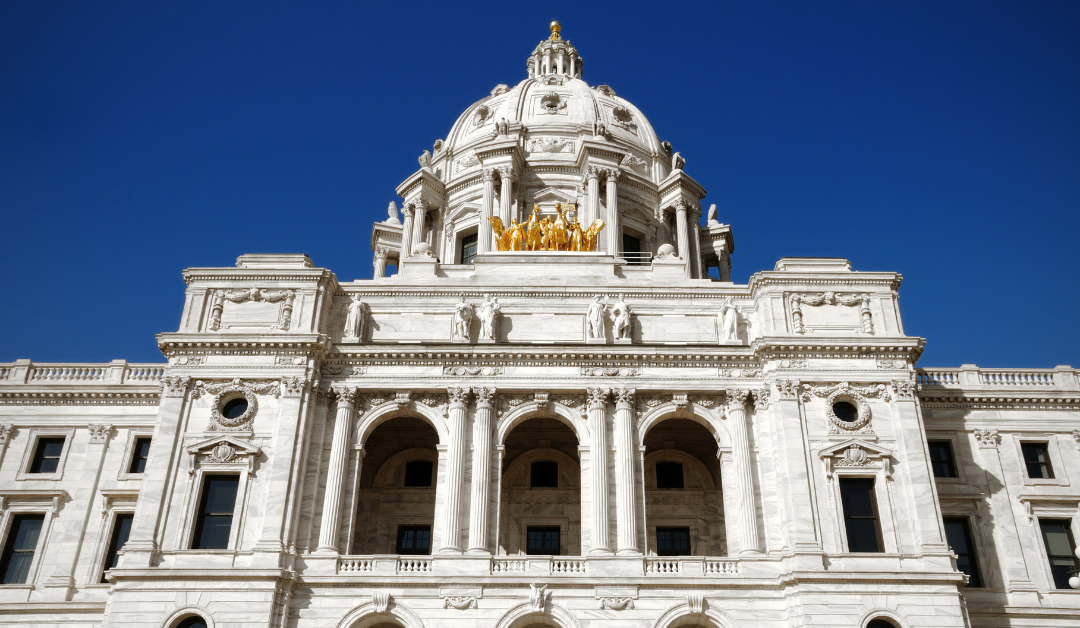While the balance of power, pending court cases and uncertainty (see: The Minnesota Legislature is Putting the Fun in Dysfunctional Government) is expected to leave the start of the 2025 Minnesota legislative session in chaos, legislators are constitutionally required to pass a balanced budget this year.
Here are some of the top issues we’re watching ahead of the 2025 Minnesota legislative session.
Budget Priorities
The legislature faces significant challenges in putting together the state budget for 2026-2027, with the projected surplus dropping from $1.7 billion to $616 million. There will be looming questions this session as many one-time funded projects seek out more money to continue. There is a structural deficit heading into future bienniums.
Paid Family and Medical Leave Implementation
Minnesota’s new paid family and medical leave program, scheduled for 2026 launch, received significant negative pushback from the business community. While the program will provide up to 20 weeks of paid leave for medical and family caregiving needs, businesses express concerns about its financial impact on their ability to do business and administrative requirements. Republicans have indicated this is a top priority issue they want to revisit this session.
Education Funding Crisis
School districts across Minnesota face mounting financial pressures from new educational mandates and rising operational costs. The Minneapolis Public School district alone is projecting an $84 million deficit for the 2025-26 academic year. Education accounts for approximately 40 percent of the state budget, and with a looming structural deficit, education funding and previously passed mandates could see some reforms and changes this session.
Environmental Regulations–PFAS
The January 2025 implementation of PFAS restrictions presents significant challenges for manufacturers. As the ban on these “forever chemicals” approaches, companies are actively seeking compliance solutions while managing operational impacts. National trade groups have already brought challenges to the laws, and groups from cookware to the automotive industry are navigating what this will mean for them. A full ban on PFAS is scheduled for 2032.
Sports Gambling
Sports gambling has been on the top of many legislators’ to-do lists over the last few years from both sides of the aisle, but they have not been able to get it across the finish line. While there continues to be strong interest in sports gambling, the current legislative landscape remains complex, particularly given the uncertain power dynamics and leadership transitions in several state house committees. This may be an issue that can gain the bipartisan support needed to pass this year, and something we’ll continue to watch with interest.
Nuclear Power Moratorium
Following the legislature’s 100% by 2040 goal set in 2023, focus has shifted from the goal to how Minnesota is going to achieve it in just 15 short years. There has been much chatter from both sides about attempts to lift the nuclear moratorium. While lifting the moratorium does not mean that construction will happen on any new nuclear plants, it does bring future new nuclear generation into the fold. Many do not believe that 100% by 2040 is achievable without including nuclear power.
Childcare Program Integrity
The continued discoveries of fraud and misuse of funds that are intended to support low-income families with child care costs has drawn a lot of attention to Minnesota’s childcare assistance programs. Exploring how Minnesota can make sure funds are getting to the appropriate individuals in need of help will be a major topic in coming months. Gov. Tim Walz has announced a new centralized investigations unit to focus on preventing future fraud and improving oversight. Expect Republicans to make a lot of noise about government accountability and oversight this session.
Reinsurance to Stabilize the Individual Market
Reinsurance will be up for renewal this year with additional dollars from the feds also expiring. If nothing is done, there are expected to be dramatic increases in health insurance premiums for tens of thousands of Minnesotans on the individual market, and it could leave as many as 95,000 Minnesotans without insurance.
Data Centers
The growing prevalence of data center investments provide opportunities for Minnesota’s tax base, but also are being closely monitored for how much energy they are using. Some legislators critical of data centers are expected to introduce legislation to create a moratorium on them this session.
Balance of Power
The question of who holds power in the Minnesota Legislature remains complex and uncertain.
With multiple seats hanging in limbo and the requirement to follow statutory timelines for scheduling special elections, the beginning of the legislative session is expected to move slowly, but could pick up fast by mid-session. Read our full breakdown on the latest regarding the balance of power here.
And if you have a priority issue you’re navigating at the Capitol this session, K2 are the experts who can help create and execute a public affairs strategy to achieve your goals.
Kayla Christensen, Director of Public Affairs

